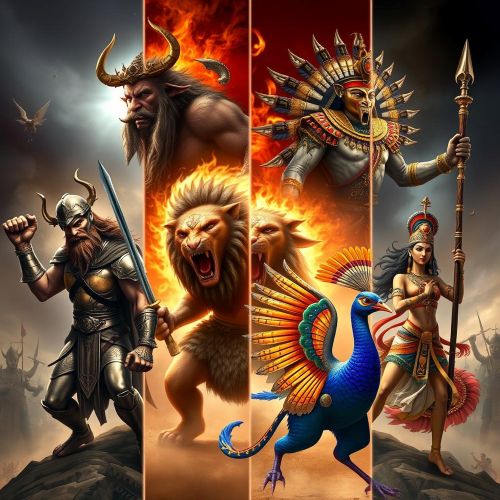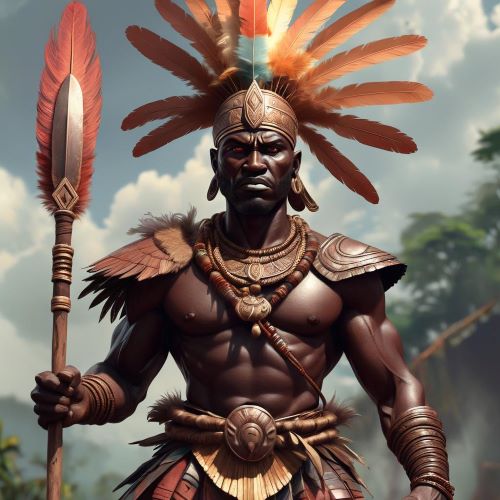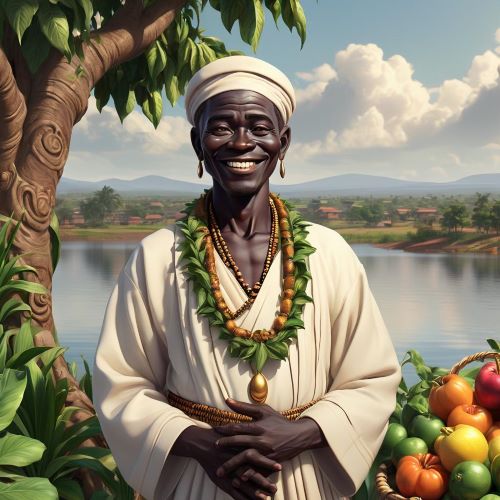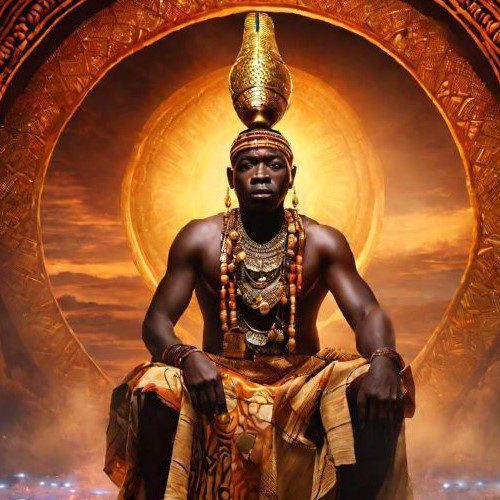Ggulu : The Sky God
Listen
At a glance
| Description | |
|---|---|
| Origin | Baganda Mythology |
| Classification | Gods |
| Family Members | Nambi (Daughter) |
| Region | Uganga |
| Associated With | Sky, Rain, Thunder, Wisdom |
Ggulu
Introduction
Baganda mythology, woven by the Baganda people of Uganda, brims with deities and spirits. Among them stands Ggulu, an intriguing figure revered as the sky god and the supreme deity. His stories intertwine with creation myths, the celestial order, and the lives of the Baganda people, offering a window into their beliefs. This exploration delves into the captivating tales surrounding Ggulu, the unseen ruler of the heavens, and explores the facets that define him.
Physical Traits
Contrary to deities with well-defined forms, Ggulu remains shrouded in mystery. Accounts of his physical appearance are scarce, perhaps reflecting the vastness of the sky he embodies. While some whisper of a colossal being dwelling within the heavens, these details remain open to interpretation. Ggulu’s power resides not in a physical form, but in his immense celestial authority.
Family
Ggulu’s lineage forms a bridge between the divine and earthly realms. He is most recognized as the father of Nambi, a key figure in Baganda creation myths. Nambi’s marriage to Kintu, the first human, establishes the foundation of Baganda ancestry. This union between the sky god’s daughter and humanity’s progenitor signifies the sacred connection between mortals and gods.
Myths delve deeper into Ggulu’s family dynamics, particularly the story of Nambi and Kintu. Kintu ventured to the heavens seeking Ggulu’s blessing for their marriage. The sky god, impressed by Kintu’s resolve, granted permission with a crucial warning: never return to the heavens, for Walumbe, Nambi’s brother representing death, would follow. Nambi’s compassion, however, led her to briefly revisit the heavens, unknowingly allowing Walumbe to descend and introduce death and suffering into the world. This pivotal moment in Baganda mythology highlights the consequences of disobedience and the complexities of the divine-mortal relationship.
Other names
The name “Ggulu,” meaning “heaven” in Luganda, resonates throughout Buganda. It’s spoken in reverence and rituals, a constant reminder of the sky god’s presence. While this is the most common name, variations like “Mugulu” exist, possibly due to regional differences. Epithets like “Muluba wa Nnalubale” (Ruler of the Sky) further solidify his celestial domain.
Baganda mythology portrays Ggulu with multifaceted titles reflecting his various roles. “Katonda,” meaning “Creator” or “God,” emphasizes his role in shaping the world and all life within it. This name highlights him as a benevolent force responsible for existence and sustenance. Another title, “Lubaale,” refers to revered spirits and deities. While applicable to various entities, in Ggulu’s case, it underlines his supreme position among the gods and his overarching influence in the spiritual realm.
Powers and Abilities
Ggulu’s power isn’t just elemental. As the sky god, he commands rain and storms, vital for the Baganda’s agriculture. He’s a sage, consulted by other deities during hardship, and his influence extends beyond the physical, governing the link between humanity and the cosmos. Ruling the heavens, Ggulu controls celestial bodies, maintaining cosmic order. He holds the power of life and death, a creator who can unleash blessings or calamity. This duality highlights his role as both judge and nurturer. Beyond elements, Ggulu’s power encompasses wisdom and foresight. He sees the past, present, and future, offering guidance to both gods and mortals.
Modern Day Influence
Ggulu’s legacy transcends myths. Storytellers weave his name into tales, and traditional dances echo his essence. Even in modern landscapes, the vast sky serves as his ever-present temple, a silent witness to humanity’s story. His influence isn’t confined to dusty legends. Proverbs and folktales keep him alive, reminding people of the sky’s power and the life-giving rain. The concept of “Ggulu” symbolizes authority, wisdom, and the divine. For a people dependent on agriculture, his role as the rain god remains deeply ingrained. While no dedicated shrines exist, the sky itself is his vast temple. A glance upwards during a storm or on a starry night evokes the unseen Ggulu, a constant reminder of the divine forces shaping the Baganda world.
Related Images
Frequently Asked Questions
What is lorem Ipsum?
I am text block. Click edit button to change this text. Lorem ipsum dolor sit amet, consectetur adipiscing elit. Ut elit tellus, luctus nec ullamcorper mattis, pulvinar dapibus leo.
What is lorem Ipsum?
I am text block. Click edit button to change this text. Lorem ipsum dolor sit amet, consectetur adipiscing elit. Ut elit tellus, luctus nec ullamcorper mattis, pulvinar dapibus leo.
What is lorem Ipsum?
I am text block. Click edit button to change this text. Lorem ipsum dolor sit amet, consectetur adipiscing elit. Ut elit tellus, luctus nec ullamcorper mattis, pulvinar dapibus leo.
What is lorem Ipsum?
I am text block. Click edit button to change this text. Lorem ipsum dolor sit amet, consectetur adipiscing elit. Ut elit tellus, luctus nec ullamcorper mattis, pulvinar dapibus leo.
What is lorem Ipsum?
I am text block. Click edit button to change this text. Lorem ipsum dolor sit amet, consectetur adipiscing elit. Ut elit tellus, luctus nec ullamcorper mattis, pulvinar dapibus leo.








